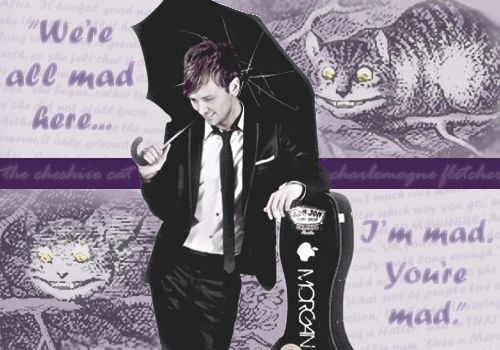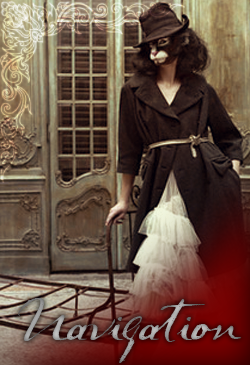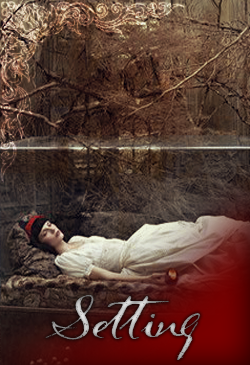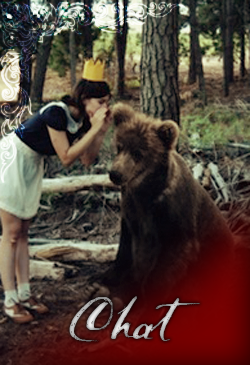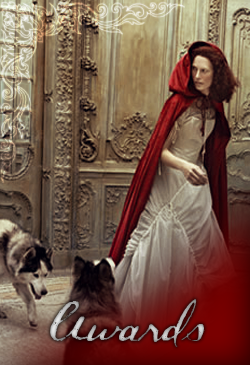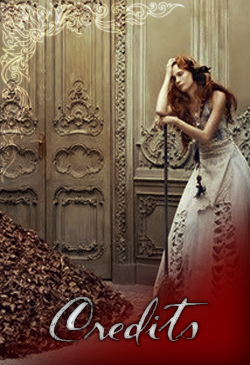Post by CHARLEMAGNE FLETCHER on Jul 3, 2010 17:44:44 GMT -5
...charlemagne bartholomew fletcher *
*We’re all mad here. I’m mad. You’re mad. *
[/size]*We’re all mad here. I’m mad. You’re mad. *

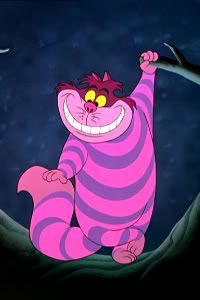
...basics*
name Charlemagne Bartholomew Fletcher. Some have questioned whether he was born with this name or if he intentionally chose the longest, hardest-to-spell words to function as his first and middle names. (NOTE: Charlemagne is pronounced SHARR-leh-mane.)
nickname Few are willing to call him by his full name, though he’d prefer it. He usually gets Char or Charlie, sometimes Fletcher, and sometimes he’s referred to as Chess or The Chess Man, due to his preoccupation with and mastery of the game.
age Twenty-one
gender Male
grade College senior
hometown Cheshire, England (The same area as Avi Abselon, though they have never met.)
sexuality Charlemagne does whatever he wants with whomever he pleases.
personification The Cheshire Cat
face claim Karl Morgan
...appearance*
hair color Dirty blonde; short, but thick, and often messy or spiky. He dyes it funny colors on occasion, if the mood strikes him.
eye color Brilliant blue, often wide open. Surprisingly, they are not very expressive at all. Charlemagne is nearsighted, so he may wear his black plastic glasses or contacts - he alternates between the two.
build Slender and graceful in an almost catlike way, but with lean muscle. He uses his subtle upper body strength to climb trees.
height 5’8”
clothing style Utterly peculiar. Charlemagne loves to startle people, and he finds that this is done easily if he uses lots of colors, clashing patterns, and strange accessories. He also loves to wear stripes, and most of the time, he’s wearing something purple.
distinctive traits His bizarre fashion sense and an eerie, wide grin that is almost always on his face.
...personal*
personality It’s absolutely undeniable that Charlemagne is somewhat…unconventional. After all, most young men his age don’t lurk in trees for passersby and then confound them with riddles, word puzzles, and cryptic advice. He’s a master anagrammer and a wonderful strategist, and his method of confusing others carries over to his strategy in chess, his favorite game. Charlemagne doesn’t know what it is about confusing people, but it gives him a thrill. Since he is almost always in a good mood of some sort – his mood ranges mostly from ecstatic to content – he is usually smiling, but is more of a realist than an optimist. He likes to joke and he is very witty, and though he often teases others, he rarely means harm. Though one might think Charlemagne would engulf himself in fantasy due to his odd opinions and actions, Charlemagne is actually a realist, deep down – he just expresses it in a very irrational way.
Charlemagne is highly intelligent and very wise, and (like certain cigarette-loving fellow Englishmen) is quite good at giving advice. However, his answers are almost always obscure, and he is never blunt or frank. His pieces of advice are like a riddle in and of themselves in that they usually must be decoded, a process that is usually too complex for most of those he gives advice to. In fact, Charlemagne often gives advice to those who don’t want or need it just for the sake of baffling them with his bizarre logic. It is certain that his thought process is not conventional, though if one can get to the heart of his advice, one will find that he actually does know what he’s talking about. He is always finding new ways to entertain himself, but his favorite way remains boggling the minds of strangers…and chess.
Very sly and sneaky, Charlemagne always seems to know too much (how he finds this information is largely unknown) and uses this information to his advantage to taunt people. In fact, Charlemagne has become somewhat of an information broker; for the right price, he can tell you almost anything you need to know. However, he knows when it’s the right time to help someone and stop playing games, and though he is never straight with his answers, he can physically chip in when necessary in a fairly simple way.
Some have wondered whether Charlemagne has some sort of mental illness, as sometimes he is seen talking to inanimate objects when there are no humans around. For instance, he often talks to trees or rocks, sometimes animals, and he has an affinity for cats – any cats. He keeps a great deal of cats and enjoys cat-related memorabilia; he has often been teased for his cat sweaters, but Charlemagne never notices. The opinions of others, good or bad, seem to roll off of him like a duck sheds water. Why he is so immune to others’ feelings is unknown, but it has kept him disconnected from others his entire life, and it’s been ages since he’s been emotionally intimate with anyone. He seems to have very high standards for relationships, standards that are largely unknown.
Charlemagne has a languid demeanor to him and is fairly lazy, often procrastinating or even ignoring things – sometimes important things, like eating or sleeping, which explains why he’s so thin. He’s fairly reclusive and won’t often talk to others outside his riddle-weaving without being approached. He is somewhat self-absorbed and usually puts his own needs before others; he is rather selfish as well, though not really greedy. . That isn’t to say he’s vain, as Charlemagne cares very little about physical appearance. Still, he’s yet to find someone worthwhile enough to put before himself. He is also fairly cheeky towards others, and he enjoys causing mischief.
Charlemagne does not wish to be thought of as weak, so he hides most of his personal life from others. His greatest secret is his severe hydrophobia; even bathtubs make him squeamish, and you will never catch him at the beach. Large quantities of water seem to be the only thing that can get under Charlemagne’s skin.
To those that know of him, Charlemagne is utterly enigmatic – no-one really knows just what he’s like or who he is or what he spends his time doing. He’s been like this most of his life, and he is quite secretive; he enjoys playing up the air of mystery that he is given. Charlemagne’s true nature is a complete puzzle that no-one can decipher; his whereabouts are largely unknown, and he is truly a mysterious individual. It’s impossible to tell what he’s thinking or feeling, or what his intentions are, and even some of the most attentive observers can’t decipher what’s behind that grinning mask he wears. But perhaps Charlemagne just likes it that way, because after all, he seems to have no intention of clearing up the mystique that surrounds him.
past Charlemagne was born in Cheshire, England on October 31st. His well-educated, very wealthy parents, Rodderick and Diane Fletcher, were both quite refined, though they had decided some time ago to move out of the hustle and bustle of London. They wanted to name their son something powerful, but sophisticated, and as soon as the name ‘Charlemagne’ came to them, the answer to their prayers was clear. Therefore, bearing the longest and hardest to spell name in his preschool class, Charlemagne Bartholomew Fletcher was more or less forced to learn to spell at a very early age, as his parents didn’t allow him to go by a nickname.
Growing up in money as he did, Charlemagne had everything any child could ever ask for, and yet, he had no friends. He was a bit idiosyncratic from the start. His parents continuously found his behavior far too profound for them – for example, he could read by age three, yet he could not tie his own shoes until he was nearly six. Something about normality was just lost on him, as, from childhood into his adult life, Charlemagne always seemed to follow the path of eccentricity. He was also very preoccupied with wind-up toys as a child, and thus had a very large collection of the things that filled up an entire bookshelf; the other two bookshelves in his room were unavailable, seeing as they held (get this) books.
Charlemagne proved himself to be a very intelligent child in the book-savvy sort of way, but his social skills and common sense were utterly hopeless. He regarded death and danger in a disturbingly cheerful way, chatted openly to strangers about the nature of fortune cookies, and jaywalked on a regular basis, which very much disturbed his prim and proper parents. Indeed, as much as they bundled up their son in neat little clothes and good manners, he always seemed to be found getting dirty or climbing a tree or folding his napkins into origami swans. And so, loving their abnormal son but failing to understand him, they sent him off to boarding school.
The strict and stingy austerity of boarding school proved of little value to Charlemagne; he kept on putting his feet on the desk and wearing colorful ties with his school uniforms and stripey socks under his trousers and wearing white trainers he drew all over and reading Chaucer and Orwell out loud to the class when the mathematics teacher was attempting to review the algebra homework. But despite his shenanigans and magic tricks (another thing he was infamous for in the school), Charlemagne got top marks, his grades faltering only when he missed classes in favor of trying to climb to the top of the largest tree in the school grounds or chasing butterflies. Still, he was popular about the student body in a “that-rich-kid-with-the-long-ass-name-sure-is-funny…and-awfully-weird” kind of way. He also became quite acclaimed for his aptitude at playing chess, and he won several tournaments in his area, though he never went on to greater fame. Charlemagne also took up the violin around this time and immediately took to the instrument.
One of the only times Charlemagne was ever physically bullied was when, at age eight, some older boys dragged him down to the creek behind the school and tried to drown him. He was saved from death only by the vice-principal, who caught the boys and rescued the soaked-through and terrified Charlemagne. The perpetrators were expelled. The experience was scarring (Charlemagne has repressed the memory), and gave Charlemagne a permanent, intense fear of water – hydrophobia.
Charlemagne did have a younger brother, who was born when he was ten years old – having been off at boarding school, he was not there to witness the birth, and saw the child for the first time when he came back over Christmas break later that year. They named the child Ainsley, and from Day One, Charlemagne was completely indifferent towards his brother. He neither acknowledged nor cared for his little brother’s existence; if anything, he teased the child whenever possible, much to the scolding of his parents. Determined to get a normal child this time around, Charlemagne’s parents spoiled Ainsley even more than their first son – if such were possible.
When Ainsley was two and Charlemagne twelve, the Fletcher family received the grave news that their Aunt Margaret, who lived in the United States, had come down with breast cancer. Since Mrs. Fletcher was extremely close to her sister, they spontaneously decided to move to the United States – New York, to be exact – to support Aunt Maggie in her fight against cancer.
Needless to say, she lost the fight, but now the Fletchers were living in a great mansion they’d purchased just outside of NYC, and there was no going back to England for them now. Once again not wishing to be too near to their elder son (and not wanting his idiosyncratic behavior to rub off on Ainsley), they sent him off to another boarding school, some distance away from New York City. He did very well, as he had before, but once again assumed the (slightly altered) title of “that-rich-kid-from-England-with-the-funny-accent-and-the-long-ass-name-sure-is-funny…and-awfully-weird,” and for that reason did not make many friends. This was also about the time he took an interest in riddles and mind games; psychology was intriguing to him, and he would often perform small experiments with his peers without telling them, testing and weighing their reactions to different things. This was also around the time he started his habit of climbing trees and calling down to those who walked below. He also resumed his position of one of the best chess players in the region, though once again, he never pursued it as a career. Though he still played the violin, he did not wish to join the school orchestra.
Around the time Charlemagne was graduating from high school, his parents both abruptly died. Apparently, on their vacation to the Carribean with eight-year-old Ainsley (Charlemagne had not attended because he had always hated being anywhere near water), they had been in a boating accident and drowned, though somehow, Ainsley had survived. Charlemagne, being eighteen by then, immediately became the sole heir (Ainsley aside) to the entire Fletcher fortune – and suddenly, he could live in that big mansion all by himself, buy as many cats as he wanted (his mother had been allergic, so his desire for cats had been denied), and never have to get a job…which was good, because Charlemagne had never been able to keep a job. Immediately refusing custody of Ainsley, Charlemagne allowed his little brother to be shipped back off to England to live with their grandparents without even a goodbye – and he doesn’t regret it to this day.
present Now in college at J Barrie University, Charlemagne attends classes, but does not live in a dorm. He stays in his mansion outside the city and plays the rich recluse, doing…whatever it is he does up there and caring for his seven cats. He doesn’t involve himself much in the social scene and prefers to focus on the academic aspect of college, though he is often seen skulking around campus, back to his old tricks of confusion and riddles. He still likes to climb trees and taunt those who go below. He is currently majoring in Psychology, though whether or not he will actually get a job or just ride the cash flow from his inheritance is hard to say.
Charlemagne seems surprisingly unfazed by the death of his parents and the absence of his little brother from his life; he never really cared much for any of them, so their nonappearance in his life is just fine with him. Since the death of the Fletchers, many rumors have been going around, and those who doubt Charlemagne’s sanity the most (for everyone does a little) believe that he intentionally murdered his parents for the inheritance. Though this isn’t true, Charlemagne likes to play up the air of mystery – he enjoys being an enigma. He also seems to have no intention of contacting Ainsley. Charlemagne also continues to play chess and his violin on a regular basis, and, due to his general knowledge of anything and everything, has become the city's go-to information broker.
family
Rodderick Fletcher – father, deceased
Diane Fletcher – mother, deceased
Ainsley Winston Fletcher – brother, 11, estranged
likes
Music (mostly instrumental pieces; he likes Beethoven the best)
Cats, and anything to do with them
Climbing trees
Riddles, mind games, anagrams, and logic puzzles
Chess
Theater (plays, not musicals; watching, not performing)
Fantasy fiction
Theories (reading about them, testing them, and creating them)
Observing people
Psychology
Mystery (he likes guessing the endings to mystery books and movies, but also likes being a mystery)
Playing the violin
Forests (he often goes on nature walks)
Stripes
Freaking out / confusing people
Amusing things
Fish and seafood (salmon is his favorite; he would never keep fish, but loves seafood)
dislikes
Water (he would NEVER, under ANY circumstances, go swimming)
Too much organization (he likes a little chaos)
His brother
Being part of a family
Tofu
Completely senseless things (most everything he does has some purpose)
Bad jokes
Deforestation
Dogs
Large animals
Green peppers
Not being able to solve a riddle
Losing at chess
Checkers
Responsibility
Work
other notes When faced with water, Charlemagne will try to keep his cool as much as he can, but he can become extremely volatile if he doesn’t get away fast. He almost always seems relaxed and even-tempered. His seven cats are named Tiberius (an orange tabby), Maximillian (a gray tabby), Paprika (a cinnamon-point Siamese), Ursula (pure black), Bertrand (solid gray with white markings), Sassafrass (a brown tabby), and Odysseus (a black and white cat). Also, though it is faded from years in the States, Charlemagne still has a British accent.
...literature*
book title Alice’s Adventures in Wonderland by Lewis Carroll
backstory First appearing to Alice when she visit’s the house of the Duchess, the Cheshire Cat is depicted as an eerily grinning feline who can dissolve into thin air and reappear at will. It greets Alice after she leaves the Duchess’s house and (after some confusing conversation) the Cat directs her to the Mad Hatter and the March Hare. Its head later reappears when Alice is playing croquet with the Queen of Hearts, and behaves rather impertinently to the King and Queen; however, when they wish to behead it, they find that he cannot be beheaded, for he is just a head.
...roleplayer*
name Zelda.
age 65 million.
gender Female
rp experience See Alex Fortescue, Avi Abselon, Ridley Fox, or Thursday Davenport.
how you found ouac See Alex Fortescue, Avi Abselon, Ridley Fox, or Thursday Davenport.
rp sample See Alex Fortescue, Avi Abselon, Ridley Fox, or Thursday Davenport.

